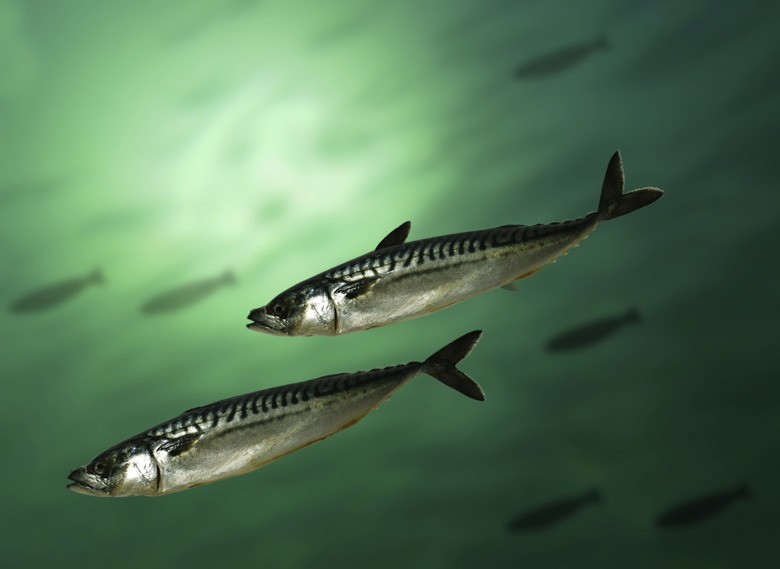A List Of Pelagic Fish
The pelagic zone within a lake or ocean includes all water that is not near the bottom, nor within the tidal zone of a shoreline, nor surrounding a coral reef. Pelagic fish spend the majority of their life cycle in the pelagic zone. Lists of marine pelagic fish species may be broken down into five subcategories based on the depth of water a species most commonly inhabits. These layers of water, in order of increasing depth, include the epipelagic, mesopelagic, bathypelagic, abyssopelagic and hadopelagic zones.
The Epipelagic, or Sunlit, Zone
The Epipelagic, or Sunlit, Zone
The epipelagic layer of the ocean extends from the surface down to about 660 feet (200 meters). Light penetrating the water at this level allows the growth of plankton, algae and floating seaweed. Small foraging fish that feed off plankton are common in this zone, including herring, anchovy, scad, sprat, sardines, small mackerels and blue whiting.
These foraging fish live in the coastal waters above the continental shelf. Larger coastal fish such as salmon, large mackerel, billfish and dolphinfish feed off the smaller fish. Apex predators such as tuna, large rays, bonita, pomfrets and open-ocean sharks such as blue and oceanic whitetip sharks are able to spend longer periods of time in the deeper waters beyond the continental shelf.
The epipelagic realm is home to genuine giants among the fishes. Voracious predators of jellyfish, the immense molas – the ocean and southern sunfishes, which may weigh more than 4,000 pounds and share top billing as the largest bony fish on Earth – mainly inhabit the open sea. The largest fish of all – the whale shark, which may exceed 50 feet in length – is an epipelagic filter-feeder targeting plankton, small fish and other diminutive prey.
Mesopelagic, or Twilight, Zone
Mesopelagic, or Twilight, Zone
A limited amount of light is able to penetrate water at a depth of 660 feet (200 meters) down to about 3,300 feet (1,000 meters), but not enough for photosynthesis to occur. Plankton filter feeders in the mesopelagic layer of the ocean like the bioluminescent lanternfish, or small predators like the marine hatchetfish, ridgehead, barreleye and stoplight loosejaw, rise up to the epipelagic zone at night to feed.
These smaller fish, along with squid, cuttlefish and krill, are eaten by mesopelagic predators like the blobfish, snake mackerel, sabertooth fish, longnose lancetfish and opah. A diverse lineup of sharks inhabit the mesopelagic zone, including lanternsharks, sleeper sharks, and cookiecutter sharks, the latter being among the predatory fish that nocturnally swim up into epipelagic waters.
Bathypelagic, or Midnight, Zone
Bathypelagic, or Midnight, Zone
Fish species in the bathypelagic layer, which is found 3,300 feet (1,000 meters) to 13,000 feet (4,000 meters) below the surface, are small predators who have evolved unusual adaptations to life in the pitch-black depths of the ocean.
Bioluminescence is common in bathypelagic fish and is used to attract prey or a mate. The humpback anglerfish dangles a luminescent lure between its eyes, the deep sea dragonfish displays a glowing barbell attached to its chin, and the tail of the gulper eel comes equipped with a luminescent tip.
The large jaws of the bristlemouth or fangtooth, hinged jaw of the viperfish and distensible stomach of the black swallower make it possible for these fish to eat other fish many times their size.
Abyssopelagic and Hadopelagic Zones
Abyssopelagic and Hadopelagic Zones
The abyssopelagic layer (or lower midnight zone) of the ocean, 13,100 feet (4,000 meters) down to just above the ocean floor, and the hadopelagic zone, which is the deep water found in ocean trenches, are inhospitable areas for fish. Squid, echinoderms, jellyfish, sea cucumbers and some species of marine arthropods call these areas home. Bathypelagic visitors like the anglerfish, black swallower and viperfish generally only stop by for a quick meal before returning to the midnight zone.
References
- National Ocean Service: What Are Pelagic Fish?
- Food and Agricultural Organization of the United Nations: Forage Species
- Food and Agricultural Organization of the United Nations: Large Pelagic Fish
- Te Ara Encyclopedia of New Zealand: The Mesopelagic Zone
- Marine Ecology Progress Series: Diets of Five Important Predatory Mesopelagic Fishes of the Central North Pacific
Cite This Article
MLA
Jacobson, Emily. "A List Of Pelagic Fish" sciencing.com, https://www.sciencing.com/list-pelagic-fish-6772945/. 30 September 2021.
APA
Jacobson, Emily. (2021, September 30). A List Of Pelagic Fish. sciencing.com. Retrieved from https://www.sciencing.com/list-pelagic-fish-6772945/
Chicago
Jacobson, Emily. A List Of Pelagic Fish last modified August 30, 2022. https://www.sciencing.com/list-pelagic-fish-6772945/
